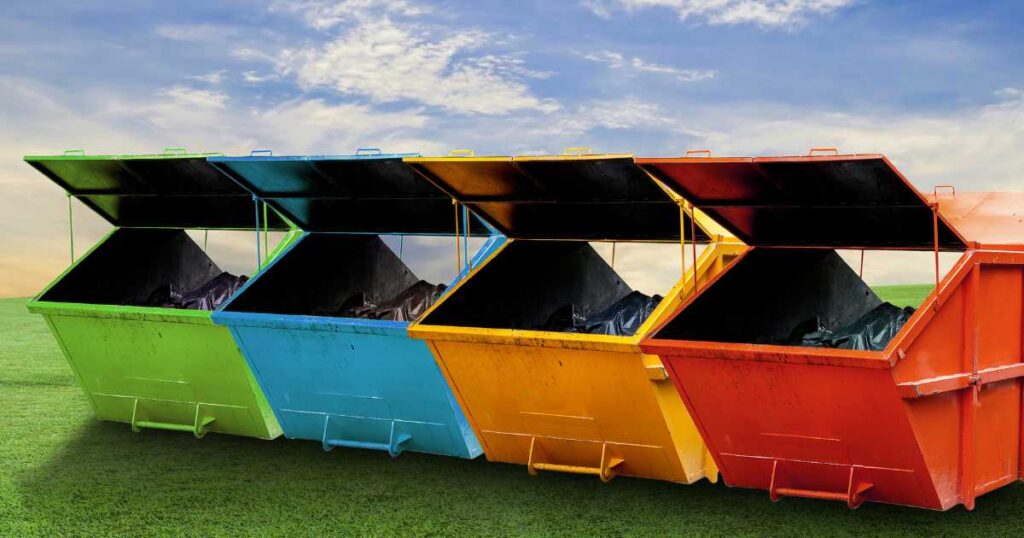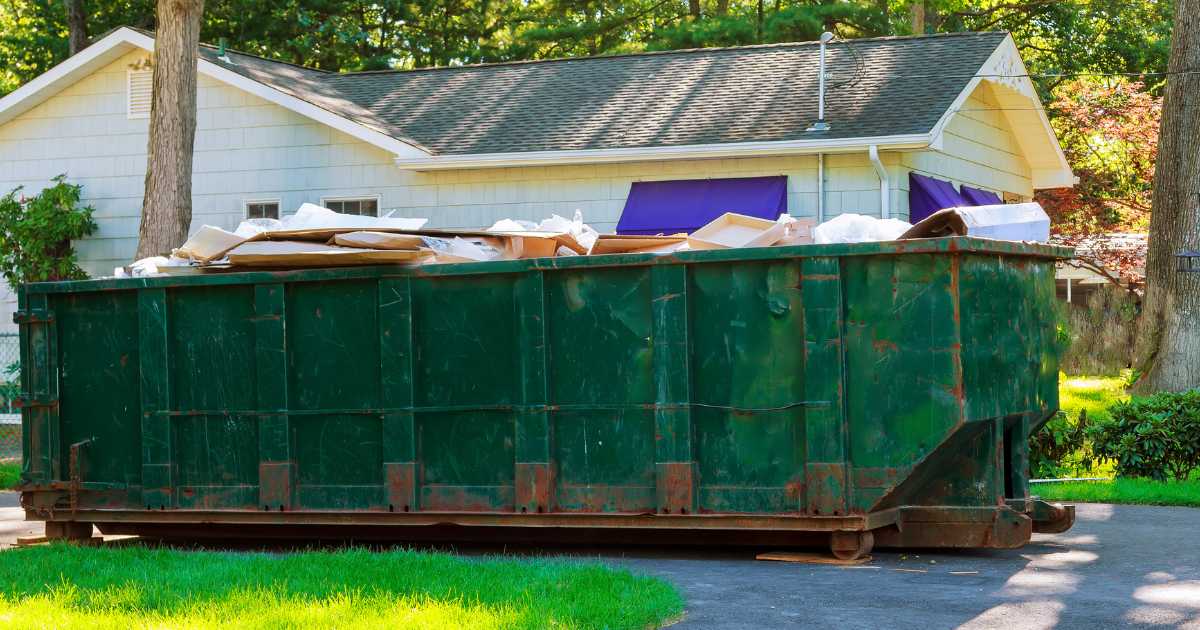Seasonal cleanouts offer an excellent opportunity to refresh your home, reduce clutter, and create organized, functional spaces. Whether you’re tackling spring cleaning, preparing for the holidays, or transitioning to a new season, a dumpster rental can streamline the process.
With the right approach, you’ll save time, effort, and money. Here’s an in-depth guide to help you use dumpster rentals effectively for your next decluttering project.
Determine Your Decluttering Goals
Setting clear goals ensures a focused and efficient process. Ask yourself the following questions:
Which areas need attention? Target spaces like the garage, attic, basement, closets, or yard. Wondering what to do with yard waste? Find out if you can throw sod in a dumpster rental.
What’s the scope of the cleanout? Decide if it’s for general clutter, bulky items like furniture, yard waste, or specific categories (e.g., old electronics or appliances).
What stays and what goes? Create a checklist of items to discard, donate, recycle, or sell.
What’s your timeline? A realistic schedule keeps you organized and prevents delays. By defining your objectives, you’ll have a clearer picture of your dumpster size and rental period needs.
Choose the Right Dumpster Size
Dumpster rental companies offer various sizes to suit different projects. Selecting the right size is crucial to avoid unnecessary costs or additional trips:
10-yard dumpsters are ideal for small projects like a single room, minor yard waste, or a closet cleanout.
20-yard dumpsters work well for medium projects, such as a garage or attic declutter.
30-yard dumpsters handle larger undertakings, like clearing multiple rooms or during renovations.
40-yard dumpsters are perfect for estate cleanouts or significant decluttering efforts spanning the entire home.
Pro Tip: Consult with the rental company for guidance. It’s usually better to choose a slightly larger size to avoid having to rent a second dumpster.

Plan the Rental Period
Estimate how much time you’ll need to complete your cleanout and choose a rental period accordingly:
Short-term rentals (a weekend or a few days) are ideal for quick decluttering sessions.
- Longer rentals (a week or more) work for larger, detailed projects.
- Avoid extra fees by realistically assessing your needs. Additionally, plan the cleanout during favorable weather conditions to make the process more enjoyable. If you live in a windy area, here’s how to secure a dumpster rental.
Check Local Regulations
Before your dumpster arrives, familiarize yourself with local ordinances to ensure compliance:
Placement guidelines: Check where dumpsters can be placed—on your driveway, the street, or your yard.
Permit requirements: If the dumpster is placed on public property, obtain any necessary permits. Homeowners’ associations (HOAs) may also have restrictions.
Disposal rules: Rental companies usually have restrictions on hazardous materials, electronics, and other items. Confirm these to avoid fines.
Prepare for the Dumpster’s Arrival
Take a few steps to prepare your property:
Clear the area: Make room for the dumpster, ensuring the rental company’s truck has easy access.
Protect surfaces: Lay plywood under the dumpster to safeguard your driveway, lawn, or patio from potential damage.
Communicate with neighbors: Notify them if the placement may temporarily impact shared spaces, such as a sidewalk or street.
Sort Items Strategically
Efficient sorting minimizes effort and ensures valuable items don’t accidentally end up discarded:
Create categories: Divide items into “keep,” “donate/sell,” and “trash.” Use bins or boxes for easy separation.
Start large: Tackle bigger items, like old furniture or appliances, before addressing smaller clutter.
Color-code bins: Label items for quick identification—green for donations, red for trash, etc.
Tip: Decluttering can be emotional. Allow yourself time to decide on sentimental items but be firm about items that serve no purpose.
Load the Dumpster Efficiently
Use space wisely to avoid overfilling or unnecessary charges:
Heavy items first: Start with larger, heavier items to create a stable base.
Fill gaps: Use smaller objects to fill empty spaces.
Break down bulky items: Dismantle furniture, flatten boxes, and compress waste when possible.
Stay within limits: Adhere to the rental company’s fill line to avoid overloading fees or safety issues.
Dispose of Restricted Items Properly
Most rental companies prohibit certain items due to safety or environmental concerns. These typically include:
Hazardous materials: Batteries, paint, chemicals, or propane tanks.
E-waste: Old electronics or appliances with specific recycling requirements. Consider hosting a dedicated hazardous waste or e-waste drop-off day before starting your cleanout. Local facilities often provide free or low-cost disposal for restricted items.
Schedule Dumpster Pickup
Once the cleanout is complete:
- Notify the rental company to arrange a pickup.
- Clear the area surrounding the dumpster for safe removal.
- Inspect the dumpster to ensure it contains no prohibited materials.
Tip: Confirm any final cleanup responsibilities with the rental company, such as ensuring the site is free of debris.

Celebrate Your Fresh Start
Decluttering your home is a major accomplishment! Take time to enjoy your refreshed, organized space:
Reorganize: Add shelving, bins, or hooks to maintain the clean look.
Decorate: Brighten the decluttered spaces with your favorite decor.
Maintain habits: Commit to seasonal purges and limit unnecessary purchases to prevent future clutter. Encourage your household to develop organized routines, making upkeep a shared responsibility.
Additional Tips for a Successful Declutter
Set a budget: Account for dumpster rental fees, permits, and any extra services.
Ask for help: Friends, family, or professionals can make the process faster and more enjoyable.
Stay safe: Wear gloves, sturdy footwear, and protective masks while decluttering.
Label donation boxes: Simplify drop-offs by marking items clearly.
Keep hydrated: Decluttering can be physically demanding—drink plenty of water and take breaks.
Frequently Asked Question
How long can I keep a dumpster for?
Most rental companies offer flexible rental periods. You can choose from short-term rentals (a few days or a weekend) to long-term rentals (up to a week or more) depending on the size and scope of your project. Be sure to check with the rental company for specific duration options and fees for extending the rental period if needed.
What can and can’t I put in a dumpster?
Each dumpster rental company has its own set of prohibited items, but generally, you cannot dispose of:
Hazardous materials: Chemicals, paint, batteries, pesticides, etc.
Electronics: TVs, computers, and appliances that require special recycling.
Medical waste: Needles, sharps, and other medical items.
Car parts and tires: Often require specific disposal methods.
Always check with the rental company for their specific guidelines and make separate arrangements for prohibited items.
How do I determine the dumpster size I need?
Consider the amount of waste you have, as well as the type (e.g., furniture, yard waste, junk). Rental companies typically offer 10-yard, 20-yard, 30-yard, and 40-yard dumpsters. If you’re unsure, it’s usually safe to choose a larger dumpster to accommodate everything without overflowing.
Do I need a permit for the dumpster?
You may need a permit if the dumpster will be placed on public property, such as a street or sidewalk. Check with your local municipality to confirm requirements. Some homeowners’ associations (HOAs) also have guidelines for dumpster placement, so be sure to consult with them if applicable.
Can I schedule same-day pickup for a full dumpster?
Many rental companies allow you to schedule next-day or same-day pickup once you’re done filling the dumpster. Be sure to let them know when you’re ready so they can arrange for timely removal.
Can I overload a dumpster to save money?
It’s important to adhere to the “fill line” indicated on your dumpster. Overloading the dumpster can result in additional fees or issues during pickup. A properly loaded dumpster ensures safe transportation and prevents penalties.
Are there any additional fees for late pickup or disposal?
Yes, some rental companies charge fees for late pickup if the dumpster exceeds the agreed-upon rental period. Additional charges may also apply for excess weight or disposal of restricted items. Be sure to clarify all terms with the rental company beforehand to avoid unexpected costs.
Conclusion:
Dumpster rentals offer a practical, efficient, and time-saving solution for tackling seasonal cleanouts. Whether you’re preparing for a new season, reorganizing your home, or clearing space for a fresh start, using a dumpster rental can simplify the process.
By following best practices for planning, selecting the right size, and adhering to local regulations, you can ensure a smooth and successful decluttering project. Remember to set clear goals, choose the proper dumpster size, and load it strategically to maximize space.
Make sure to dispose of restricted items in an eco-friendly way, and celebrate the rewards of your hard work once your cleanout is complete. By turning to a dumpster rental, you save yourself time, effort, and the stress of managing large amounts of clutter—creating a home that feels fresh, organized, and welcoming.
Ready to get started? Renting a dumpster might be the best way to refresh your living space and take control of the clutter once and for all!
